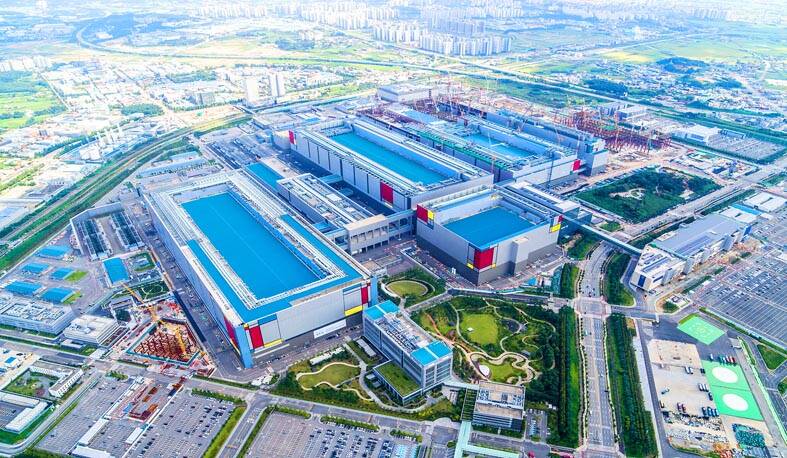South Korea is mustering its largest companies — including Samsung Electronics Co — to pour about US$422 billion into areas such as chips and electric vehicles in its most aggressive effort yet to win a heated global race for tech supremacy.
The government will focus support on chips, batteries, robots, electric vehicles, displays and biotechnology in an investment plan through 2026, South Korean President Yoon Suk-yeol said yesterday.
The blueprint includes the creation of hubs housing chipmaking mega-plants, design houses and material suppliers to bolster the nation’s own supply chain.

Photo: Reuters
That would provide an initial kick for Samsung, which plans to spend about 300 trillion won (US$228 billion) over the next two decades to build a new chipmaking complex on the outskirts of Seoul.
The world’s largest memory maker is investing heavily in its foundry capabilities in a bid to challenge far-bigger rival Taiwan Semiconductor Manufacturing Co (台積電) as the center of global chip manufacturing.
“The economic war that began recently in semiconductors is broadening to advanced industries such as batteries and cars of the future,” Yoon said in a televised briefing. “Each country is sparing nothing in large-scale subsidies and tax benefits to build cutting-edge manufacturing facilities at home.”
The acceleration of funding comes as policymakers from Washington to Beijing throw billions of dollars into a race to build up domestic production lines, after COVID-19 pandemic shortages laid bare the risks of depending on a global supply chain for linchpin technologies.
The US has been leading efforts to build chip production capacity at home, but companies are now weighing the strings attached to government support.
Samsung’s investment would be the core part of South Korea’s push. The company plans to build five memory and foundry fabs in a new chip cluster in Yongin by 2042, where it seeks to attract more than 150 local and foreign chip companies.
Samsung, along with SK Hynix Inc, together dominate the world’s memorychip market. South Korea, which also leads in promising arenas such as organic light-emitting diode displays, is also home to automaker Hyundai Motor Co and display manufacturer LG Electronics Inc.
However, the country is still largely dependent on foreign firms for materials, parts and equipment needed to assemble chips and other products, South Korean Minister of Trade, Industry and Energy Lee Chang-yang said.
Its tech leadership faces growing challenges as memory chips and displays become increasingly commoditized, and as the US and China — the world’s two largest economies — increase spending to boost domestic production capacity.
“The hegemonic competition between the US and China over cutting-edge tech is turning into a full-blown war,” Lee said, adding that Japan and Taiwan are spending more to support tech industries.
South Korea has been strengthening its economic ties with the US and reducing its reliance on China. Samsung has been aggressively expanding its most advanced plants at home in Pyeongtaek.
It also plans to build a new foundry in Taylor, Texas, by next year, and has been mulling several possibilities for future factories, including Texas and Europe.

WEAKER ACTIVITY: The sharpest deterioration was seen in the electronics and optical components sector, with the production index falling 13.2 points to 44.5 Taiwan’s manufacturing sector last month contracted for a second consecutive month, with the purchasing managers’ index (PMI) slipping to 48, reflecting ongoing caution over trade uncertainties, the Chung-Hua Institution for Economic Research (CIER, 中華經濟研究院) said yesterday. The decline reflects growing caution among companies amid uncertainty surrounding US tariffs, semiconductor duties and automotive import levies, and it is also likely linked to fading front-loading activity, CIER president Lien Hsien-ming (連賢明) said. “Some clients have started shifting orders to Southeast Asian countries where tariff regimes are already clear,” Lien told a news conference. Firms across the supply chain are also lowering stock levels to mitigate

Six Taiwanese companies, including contract chipmaker Taiwan Semiconductor Manufacturing Co (TSMC, 台積電), made the 2025 Fortune Global 500 list of the world’s largest firms by revenue. In a report published by New York-based Fortune magazine on Tuesday, Hon Hai Precision Industry Co (鴻海精密), also known as Foxconn Technology Group (富士康科技集團), ranked highest among Taiwanese firms, placing 28th with revenue of US$213.69 billion. Up 60 spots from last year, TSMC rose to No. 126 with US$90.16 billion in revenue, followed by Quanta Computer Inc (廣達) at 348th, Pegatron Corp (和碩) at 461st, CPC Corp, Taiwan (台灣中油) at 494th and Wistron Corp (緯創) at

NEW PRODUCTS: MediaTek plans to roll out new products this quarter, including a flagship mobile phone chip and a GB10 chip that it is codeveloping with Nvidia Corp MediaTek Inc (聯發科) yesterday projected that revenue this quarter would dip by 7 to 13 percent to between NT$130.1 billion and NT$140 billion (US$4.38 billion and US$4.71 billion), compared with NT$150.37 billion last quarter, which it attributed to subdued front-loading demand and unfavorable foreign exchange rates. The Hsinchu-based chip designer said that the forecast factored in the negative effects of an estimated 6 percent appreciation of the New Taiwan dollar against the greenback. “As some demand has been pulled into the first half of the year and resulted in a different quarterly pattern, we expect the third quarter revenue to decline sequentially,”

ASE Technology Holding Co (ASE, 日月光投控), the world’s biggest chip assembly and testing service provider, yesterday said it would boost equipment capital expenditure by up to 16 percent for this year to cope with strong customer demand for artificial intelligence (AI) applications. Aside from AI, a growing demand for semiconductors used in the automotive and industrial sectors is to drive ASE’s capacity next year, the Kaohsiung-based company said. “We do see the disparity between AI and other general sectors, and that pretty much aligns the scenario in the first half of this year,” ASE chief operating officer Tien Wu (吳田玉) told an